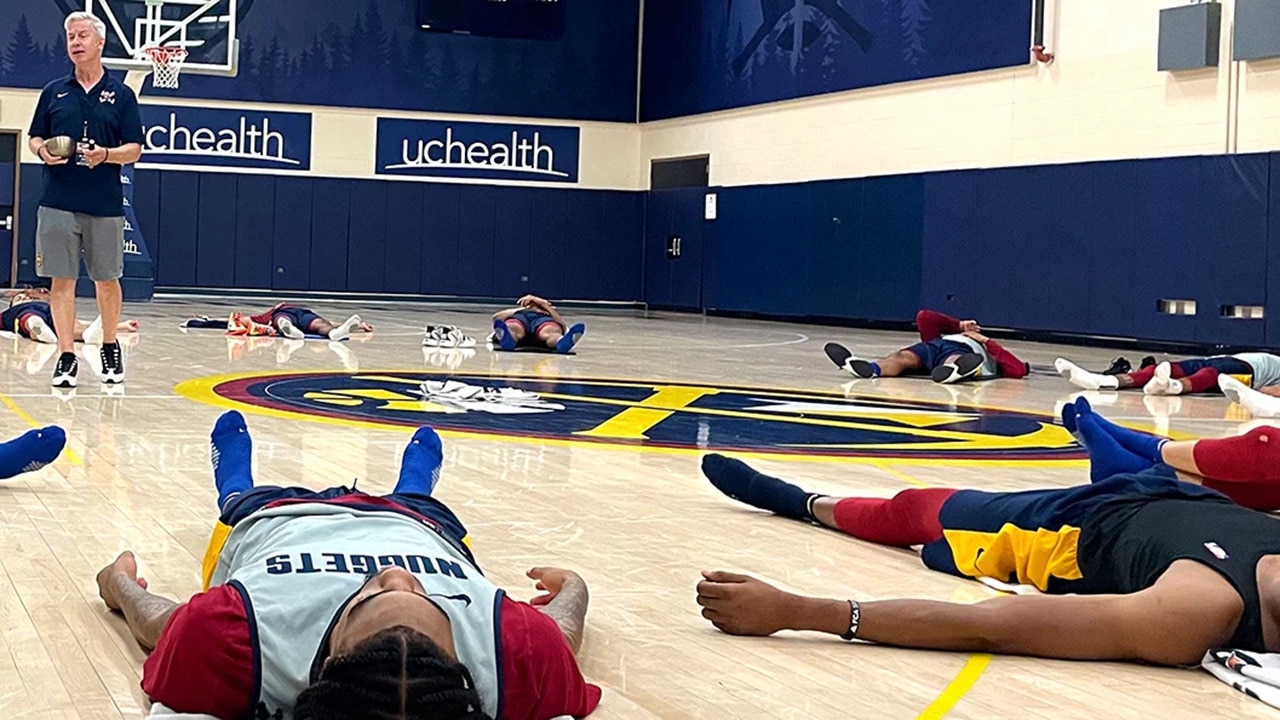It's no secret that the Denver Nuggets are the current NBA World Champions. But did you know that the work they put in off the court might be one of the main reasons the took home the trophy? Alex Reed, PsyD, MPH at the University of Colorado School of Medicine, is also the Denver Nuggets Team Psychologist and an essential piece to their championship team. Read on to hear how a sports psychologist can make a difference as an individual player and within a team.
Supporting professional teams from the outside, fans fixate on the black-and-white peaks and valleys they watch from the sofa or the stands – the big wins and triumphant seasons along with the painful losses and agonizing rebuilds. Sometimes, as in the case of last year’s Denver Nuggets and the 2021-22 Colorado Avalanche, their team delivers pure ecstasy – a long-awaited championship.
But from the inside, the team is a complex entity layered in shades of gray. It’s a blend of personalities, nuances and styles all striving for that elusive trophy. And, especially in team sports, cultivating esprit de corps is a challenging task. Without a unified culture, the summit remains out of reach.
Alex Reed, PsyD, MPH, the Nuggets’ psychologist since 2019, has been behind-the-scenes, supporting the patient, gradual climb of the oft-struggling team into NBA champions.
Following is a Q&A with Reed, who gives insights into the joys and challenges of providing psychological care to the reigning NBA champions. The interview has been edited for length and clarity.
What does a team psychologist do?
It’s a number of things, but the first is building trust with the players and the team. That’s first and foremost. And from there, it can really be focused on many areas, such as when players find that their mind is getting in the way of their performance. They may be experiencing stress, or they might be having problems focusing and concentrating. They may go into a slump.
I work with the players and build on their tools and skills to help manage the stress and strain that they experience. I teach them skills on how they can learn to reset themselves within a game as well. I teach mindfulness skills, meditation skills and relaxation and breathing skills. We also do things like goal setting: If you want to work on this particular skillset, how can we break this down into small skills as well?
Why is psychological care so important to athletic performance?
First, sports are wonderful and bring people together. It’s an opportunity to excel in an area, and it feels good as well. There are just so many benefits to physical activity and exercise, and yet, there can also be tremendous pressure that athletes experience. And with that pressure of wanting to perform their best, the athletes at times can start to be pretty hard on themselves. When the stress and maybe worry kicks in, feeling sad, like I’m not doing my best, then that has an effect on performance.
Can you give examples of how you help the players?
Players are human, and they can get down, they can get anxious. That’s when I’ll meet with them one-on-one to give them tools to help with whatever they’re facing – it could be anxiety, it could be with depression. Also, too, when players get injured it’s a huge adjustment for them. All of the sudden, they can’t do their job, and it may be some time before they get back to their role. Now they have to follow a different routine, and that takes a different type of focus. So I’ll work with them on managing the stress and strain of rehab as well.
The Nuggets had many years of steadily building until they became title contenders. What did you do in psychological terms to help the team have patience during that long run-up to last year’s high point?
That’s where a lot of mindfulness meditation has been useful. It helps players and the team to be able to focus on one game at a time. Because if you think too far in the future, then your thinking can go in many different directions, versus what’s just right in front of us.
From your perspective as a team psychologist, what does it look like when a team has a strong culture, and how hard is it to develop?
It’s almost like improv theater, in a sense, where players work to make each other look good … when there’s a success there, you see the players cheer each other on. For example, when a bench player who maybe hasn’t gotten a lot of minutes has an amazing play, seeing everyone rising up and celebrating, that’s the sign of a great culture. They celebrate the wins, but it’s more about celebrating each other and making each other look good out there. And that’s what we’ve seen with the Nuggets. Their bond continues to grow and grow, which has been so much fun to watch.
What were the issues you dealt with as the pressure mounted last spring and the team approached getting over that final championship hump?
In one sense, because they worked so well together, I haven’t had to do as much, which is a great thing. They did many activities off the court together. It might be anything from going to see a movie to going to play pickleball or have team dinners together – things like that. So when they would get together, my main objective was to make sure they were all watching out for each other and keeping each other’s spirits up.
Now that the team has won the Larry O’Brien trophy, what are the challenges of sustaining that level of competitive fire, that desire to repeat as champions?
For us, this is our first time being champions. There has been messaging (to the team) and part of this is ‘everyone wants it.’ Everyone wants the trophy. And so the question is: How much do you want it as well? It was great to see them all playing the other day (the season-opening victory over the L.A. Lakers) and there were incredible performances out there. It’s really about getting back to that focus of one game at a time. I think that’s the big piece of maintaining that.
Is sports psychology in reality anything like the way it’s portrayed on a popular show like “Ted Lasso?”
What I really appreciated was how the show portrayed that these players all have their own stories, strengths and challenges. I like how it showed that shared humanity and how people go through really hard times – even at the elite athlete level.
I was recently at a mental health talk through the NBA Players Association and one of the speakers, a film professor in New York City, talked about how professional athletes, and even college athletes, can almost be viewed as an avatar, where they’re just this entity, rather than being a person with families and so forth. And with sports betting, that (commodification of the athlete) becomes even bigger. It’s so important to remember that these are people first and athletes second.
The Nuggets have a particular superstar who has a famously calm and unflappable demeanor. Are there qualities from such a player that rub off on teammates or help model ways to approach stress amid the professional sports cauldron?
Having an incredible player who is one of the world’s best, that absolutely rubs off on everyone. And in our case, having multiple players that are exceptional sets a tone and shows how people can learn from each other and complement each other. It’s truly amazing to watch.
I’ve also learned how tough of a business this is. It is a grind. There’s so much that goes on behind the scenes that the public doesn’t necessarily know about, especially how hard everyone works in the organization. It reminds me a lot of medicine. I see a lot of similarities in terms of how hard healthcare providers and their teams work behind the scenes. All the patients see, like the fans, is just the show.
What is your favorite part of the job?
There is so much I enjoy about this work, it’s honestly difficult to pin it down. First, it’s just incredible to be around these elite athletes who are hilarious, kind and hard-working. They have welcomed me into a world I never expected to be a part of. Second, when I work with someone and provide a tool or they get an insight, and it clicks. The joy comes from seeing them apply it in some way, and then to see how that plays out for them, be it in their personal or professional lives. So to me, that’s the most satisfying part – to see what they do with it and how they may grow it as well.
Reed, an associate professor of family medicine and obstetrics/gynecology at the University of Colorado School of Medicine, first noticed that sports psychology overlapped with his clinical career while teaching a class at Wichita State University in 2006. A former athlete himself (baseball, soccer and golf), Reed’s interest in the field grew as faculty for a family medicine residency with a sports medicine fellowship in Boise, Idaho, where he began helping collegiate athletes with sports-related stress and strain.
Coming to CU Anschutz nine years ago, Reed, who is also director of behavioral health education for the family medicine residency, met CU Department of Family Medicine colleague Morteza Khodaee, MD, who is the Nuggets’ team physician. The Nuggets invited Reed to give players a session about sleep, which went well and blossomed into the team psychologist job, which is a Nuggets partnership with UCHealth and CU Sports Medicine. The role dovetails with the NBA’s push for mental health services for players, coaches and staff.
Asked what goes into developing team culture, Reed, who teaches a class called Medical Improv at CU Anschutz for medical students, said the dynamic in sports is similar to improv theater. “What I see in the (team) culture, the players support each other, make each other look good, take risks, and they also make sure to have fun and cheer each other on,” he said.
Photo: https://news.cuanschutz.edu/

